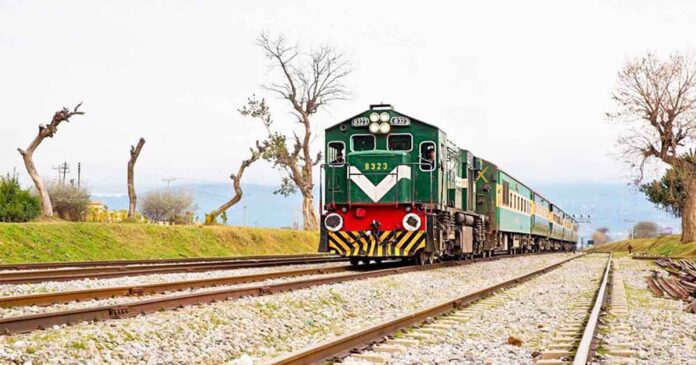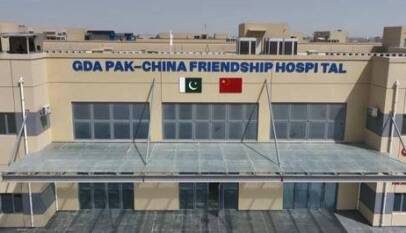Pakistan, China to sign addendum on ML-1 railway project
Pakistan and China are set to sign an addendum on the ML-1 railway project during the upcoming Belt and Road Forum. The project aims to connect Karachi to Peshawar and had an initial cost of $9.8 billion, but Pakistan has proposed reducing it to $6.6 billion through project design amendments. The project will now be completed in three phases, with upgraded sections and enhancements planned. The project is expected to take sixteen years and increase the number of trains from 34 to 134. The main challenge remains securing international financing with the need for a sovereign guarantee from Pakistan.
ISLAMABAD: China and Pakistan will ink significant agreements regarding motorways and highways during the upcoming four-day visit of caretaker Prime Minister Anwaarul Haq Kakar to Beijing, starting from Oct 16.
The agreements will be signed under the China-Pakistan Economic Corridor (CPEC).
PM Kakar is visiting China to attend ‘Third Belt and Road Forum (BRF) for International Cooperation’, being held in Beijing from Oct 17 to 18.
“The prime minister will attend the opening ceremony of the BRF and address the high-level forum entitled ’Connectivity in an Open Global Economy,” the PM office said in a post on X on Saturday.
Taliban to join forum
The premier will hold a bilateral meeting with Chinese President Xi Jinping on the occasion. Besides, he is expected to meet several other leaders during the two-day moot. Senior Chinese officials, business leaders and investors as well as leaders from 130 countries, ranging from Russian president to representatives of the Taliban administration, are expected to attend the Forum, according to Reuters and AFP reports.
The forum in Beijing marks the 10th anniversary of President Xi’s ambitious global infrastructure and energy initiative, billed as recreating the ancient Silk Road to boost global trade.
Highway Research & Training Centre
For Pakistan, one of the significant Memorandums of Understanding (MoUs) to be signed is related to the establishment of a modern Highway Research & Training Centre (HRTC) with Chinese assistance. The project will prominently take centre stage during the PM’s discussion with Chinese authorities.
HRTC is a subsidiary of National Highway Authority (NHA) for carrying out indigenous research in various faculties of highway engineering not limited to pavements, bridges, tunneling environmental engineering, hydraulics and Geotech, but also covering technical training.
An NHA official said the HRTC also affiliated various engineering institutes in research, especially in pavements, including National University of Science & Technology (NUST). The highway authority has also proposed Frontier Works Organisation (FWO) Tunneling Institute to become an associate in research in tunneling. Under the ambit of CPEC, there is a promising joint research programme envisioned with the government of China from 2023 to 2027. The programme aims to foster collaboration and innovation in various domains of highway engineering.
A formal memorandum of joint research extension will be finalised and signed during the PM’s visit to China.
“We anticipate its significance in furthering the infrastructure cooperation between China and Pakistan. This extension is poised to be a cornerstone of joint cooperation in the road infrastructure with the National Highway Authority being a vanguard of such mutual cooperation,” the official said.
Under the agreement, HRTC Research Institute will be constructed on 530 acres, already acquired by the NHA at cost Rs520 million.
The official said the institute would be built by a Chinese consultant under a Chinese grant of $52 million (374 million yuans or Rs15 billion). It includes infrastructure, a test track and indoor and outdoor lab equipment. After completion and required training, it will be handed over to the NHA for operation.
The institute will also conduct studies of long-term pavement performance under controlled and uncontrolled conditions. Similarly, various research projects in reclaimed asphalt, bridges and tunneling, training and degree courses in China and development of engineering design manuals and standards for Pakistan are also included in it.
KKH upgrade
Prime Minister Kakar will also sign an MOU to upgrade Karakorum Highway (KKH) from Raikot to Thakot, Raikot to Khunjerab (335 km), KKH phase-2 on the E-35 section from Havelian to Thakot, covering 120km and introduction of a motorway section connecting Havelian to Mansehra.
In a second phase of KKH project, the official said, the road would be designed in a way that it will remain operational round the year, especially in winters when it is closed due to heavy snowfall. The KKH alignment is being designed in a way that it will not hit Bhasha Dam but it will go over it through tunnels.
Zhob motorway
The PM will also hold discussion on the construction of a motorway from Dera Ismail Khan to Zhob, while Gwadar port will remain the centre of discussion during the meetings in Beijing.
China to set up technical centre for youth
ISLAMABAD – In a meeting between Secretary of Education Mr Mohyuddin Ahmad Wani and …












